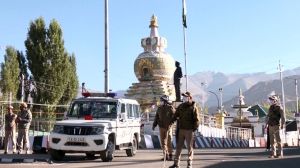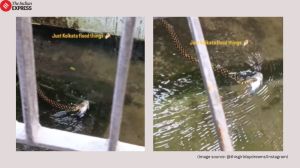All India Police Science Congress should reinvent to become more relevant in modern age: Amit Shah
Amit Shah asked if the AIPSC can make sure that the “data lying in silos are integrated using AI and put to use” before the next congress.
 At the Golden Jubilee function of the 50th All India Police Science Conference, in Gandhinagar, on Monday, Home Minister Amit Shah said the government had reduced violence by 70% in three disturbed areas including Kashmir, North East and Naxal-affected regions. (PTI Photo)
At the Golden Jubilee function of the 50th All India Police Science Conference, in Gandhinagar, on Monday, Home Minister Amit Shah said the government had reduced violence by 70% in three disturbed areas including Kashmir, North East and Naxal-affected regions. (PTI Photo)The All India Police Science Congress (AIPSC) should reinvent itself to become more relevant in the modern age and take forward the policies already framed in the criminal justice system so that their implementation can reach down to the beat-constable level, Union Home Minister Amit Shah said on Tuesday.
Shah was speaking on the opening day of the 50th meet of the AIPSC organised by the Bureau of Police Research and Development (BPR&D) at the Rashtriya Raksha University (RRU), Gandhinagar.
The event will conclude on Wednesday.
Addressing delegates from across the country, Shah recalled that a senior official had once told him that the AIPSC had become just a reason to hold meetings.
Shah said, “While I cannot ignore this statement completely, I acknowledge that without the AIPSC, it is not possible to keep our policing relevant with the times. However, it is also true that for the last 50 years, the world and policing have changed so much but the system of the Congress has not kept pace. The AIPSC is to keep our criminal systems relevant against threats. There are 250 people in this room and their job is to make the entire system relevant. And when there is such a responsibility, we need to make sure that decisions taken here percolate right down to the beat constables.”
Also present at the event were Union Home Secretary Govind Mohan, Gujarat Director General of Police (DGP) Vikas Sahay, RRU Vice-Chancellor Dr Bimal Patel, National Forensic Sciences University (NFSU) VC Dr JM Vyas, BPR&D Director General (DG) Rajeev Kumar Sharma, and Additional DG Ravi Joseph Lokku.
Speaking on the government’s aim for the criminal justice system, Shah said: “Since I was born, I have been hearing that it takes a long time to get justice from courts. But after the three new criminal laws get fully implemented, justice will be delivered within three years from the time of filing of FIR, even if the case reaches the Supreme Court… We have set our sights not just on the aim but the end results.”
Speaking on the work done in the four years prior to the introduction of the three criminal laws, Shah said: “We completed the computerisation of all police stations, 22,000 courts were integrated into E-courts. We have data of 2 crore prisoners in the prison system, 1.5 crore cases’ data in e-prosecution, 33 lakh results data in e-forensics, 1.06 crore fingerprint data, a total of 22,000 complete cases relating to terrorism … 16 lakh alerts have been generated till date in the crime multi-agency centre. We thus streamlined the entire system before introducing the three criminal laws.”
He further asked if the AIPSC, before the next congress, can make sure that the “data lying in silos are integrated using AI and put to use”.
Detailing the five major areas that are likely to remain challenging in the near future and where the police forces need to be ahead of the curve, Shah told the delegates to concentrate on cybercrime, border infiltration, drone technology, narcotics, and the darkweb.
Make 10-year road map, Shah tells AIPSC
He urged the AIPSC to make a 10-year road map with reviews at intervals to gauge the work done.
Speaking of India’s successes, Shah said: “Our economy was ranked 11th in the world, now it is 5th and by April 1, 2028, I can assure you that we will be the third largest economy in the world. When we talk to pollsters and election pundits, they are surprised that with a voter base of 97 crore, we had to conduct re-elections only on 16 booths. We have seen countries with far more technology where counting goes on for days.”
He further said: “When Covid came, developed countries were worried about us. We have to accept that at that point in time, our health infrastructure was not so strong. But by the time Covid ended, the world had to accept that India did the best job against the pandemic.”
Shah said India has “brought radical change to our criminal justice system”.
“The next 10 years will establish Indian criminal justice as the most modern, scientific and fast in the world,” he added.
Shah said the living standard of 7 crore people has been raised and 25 crore people have been brought out of poverty. “We have reduced violence by 70% in three disturbed areas including Kashmir, North East and Naxal-affected regions,” he added.
Over the last 10 years, he said, India has seized 5,35,000 kg narcotics worth Rs 35,000 crore. “This is six times more than the decade before that. It is not that more drugs are being consumed, it is that we have seized more drugs through scientific methods,” he explained.







